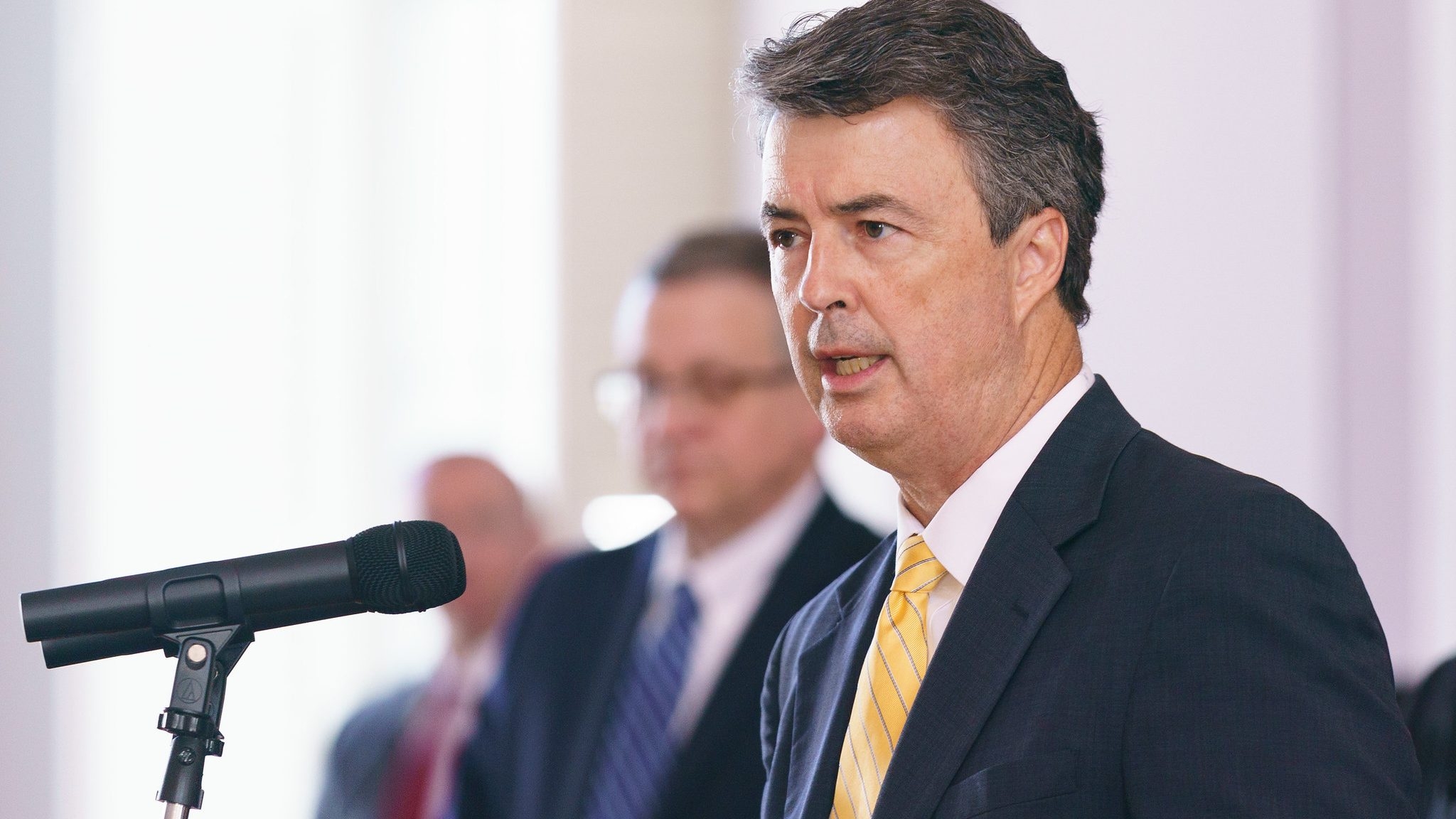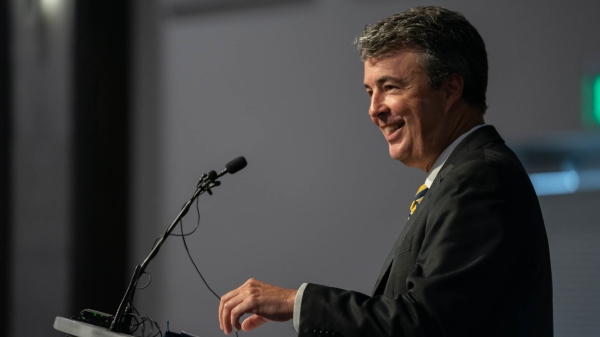It’s been three months since Alabama Attorney General Steve Marshall said he’d conduct an “internal review” of the nonprofit he leads and its role in paying for robocalls urging attendance at the Jan. 6 rally prior to the deadly U.S. Capitol attack.
It was unclear Thursday if Marshall’s review has concluded, or whether other independent reviews may be underway.
Marshall heads the Rule of Law Defense Fund, the dark money fundraising arm of the Republican Attorneys General Association, which paid for robocalls detailing when and where citizens should meet at the Jan. 6 rally, which was first reported by the watchdog investigative journalism group Documented.
“We will march to the Capitol building and call on Congress to stop the steal,” the robocall says, as recorded by Documented. “We are hoping patriots like you will join us to continue to fight to protect the integrity of our elections. For more information, visit MarchtoSaveAmerica.com. This call is paid for and authorized by the Rule of Law Defense Fund.”
The now inactive website for the rally — marchtosaveamerica.com — is now down, but from the earliest archived version available, on Jan. 3, the Republican Attorneys General Association is listed as one of the 10 “coalition partners.” Later that same day, in a separate archived version of the site, the group was no longer listed as a participant but was instead replaced with the Rule of Law Defense Fund.
Marshall, in a Jan. 8 message to APR, said he had no knowledge of his organization’s role in the robocalls, and said he had “directed an internal review of this matter.”
“I condemn, in the strongest possible terms, the actions of those who attempted to storm the U.S. Capitol, a place where passionate but peaceful protestors had gathered and lawmakers debated inside,” Marshall said in the statement.
A spokesman for Marshall in his state office referred APR’s questions about the internal review to Johnny Koremenos, a spokesman for the Republican Attorneys General Association. Marshall’s spokesman had previously responded to APR’s questions about the matter directly. Koremenos didn’t respond to questions Thursday.
Margaret Huang, CEO and president of the Southern Poverty Law Center’s Action Fund, in January called for the Alabama Ethics Commission and the Alabama Bar Association to conduct independent reviews “into Marshall’s knowledge of and participation in Wednesday’s insurrection and, if warranted, impose appropriate penalties.”
A spokeswoman for the Alabama Bar Association in a message to APR on Thursday cited Rule 30 of the Alabama Rules of Disciplinary Procedure, which states that all proceedings by the Alabama State Bar are confidential until either someone pleads guilty, or are found guilty.
“So, we cannot confirm or deny the existence of an investigation,” the spokeswoman said.
A subsection of Rule 30 does allow the disciplinary commission or the disciplinary board by a majority vote to allow the chairman to make a brief statement to the media indicating whether there is or isn’t an investigation “In cases of extreme notoriety…” but asked by APR if Marshall’s matter could fall under the subsection, the spokeswoman said no.
“The Office of General Counsel would not consider the incident described to be one of extreme notoriety. The Disciplinary Commission does not meet until April 14, which is the earliest a request under Rule 30(d) could be considered,” she said in a message.
Tom Allbritton, executive director of the Alabama Ethics Commission, in a response to APR on Thursday said “we are not allowed to comment on whether any matter is pending in our office.”
Lecia Brooks, chief of staff for the SPLC Action Fund, in a statement to APR on Friday said the matter meets the threshold of “extreme notoriety” and Marshall should be held accountable.
“Marshall leads an organization that directly funded robocalls to recruit radicalized extremists to a violent march on the U.S. Capitol to stop the certification of a democratic national election,” Brooks said. “Some of these marchers themselves as well as Capitol Police died during and in the days following the insurrection because of the violence and trauma. That clearly qualifies to any reasonable observer as an event of ‘extreme notoriety.’
“Being an elected official in Alabama should never shield someone from accountability for their actions,” Brooks continued. “Ethics means nothing if Marshall can wantonly violate his core responsibilities as an elected official and member of the Bar.”
Adam Piper, then-director of the Republican Attorneys General Association, in a response to APR in January said the group had no role in planning the rally.
“The Republican Attorneys General Association and Rule of Law Defense Fund had no involvement in the planning, sponsoring, or the organization of yesterday’s rally. No Republican AG authorized the staff’s decision to amplify a colleague speaking at the rally,” Piper said.
Charles Herbster, who was then the national chairman of the Agriculture and Rural Advisory Committee in Trump’s administration, in a Facebook post at 8:33 p.m. on Jan. 5 said that he was standing “in the private residence of the President at Trump International with the following patriots who are joining me in a battle for justice and truth.”
Herbster said that with him in the room were Adam Piper, Sen. Tommy Tuberville, Donald Trump Jr., Eric Trump, Trump’s former National Security Advisor Michael Flynn, adviser Peter Navarro, Trump’s 2016 campaign manager Corey Lewandowski and 2016 deputy campaign manager David Bossie.
Tuberville through a spokesperson told APR he didn’t attend a Jan. 5 meeting with Trump’s sons and top aides, but after photos surfaced of Tuberville in the hotel that day, Tuberville later said he attended a Republican fundraiser at the hotel on Jan. 5.
Marshall told The Montgomery Advertiser on January 11 that the internal review is ongoing, and seemed to signal that as a private nonprofit, RLDV isn’t required to discuss personnel matters.
“We’re a private agency. A nonprofit we don’t necessarily publicly announce what goes on from an employee discipline standpoint, but we are engaging in a vigorous review and we will get that completed here shortly,” Marshall told the newspaper’s Brian Lyman.
Piper resigned as director of RAGA on Jan. 12. Attempts to contact Piper this week were unsuccessful.
The New York Times reported on Jan. 21 that a donor to the Rule of Law Defense Fund stipulated that their money be used for the robocall.
“Two people with direct knowledge of tense discussions that took place among the attorneys general after word of the call leaked said that a donor had demanded it and made a contribution contingent upon its release,” the newspaper reported.
Four protestors and a Capitol police officer died during and after the Jan. 6 attack.














































